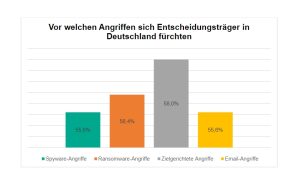
Cyber security: A quarter of German companies invest too little in preventing cyber security incidents. 82 percent of companies in Germany have already been victims of cyber attacks. A Kaspersky report shows that companies depend on partners.
One in ten security incidents avoided is serious. However, the current Kaspersky report “Cybersecurity cornerstones for proactive decision-makers” shows that 26 percent of decision-makers in Germany (23 percent in Europe) do not invest enough in the prevention of cybersecurity incidents. With more than three in four respondents (82 percent; Europe 79 percent) having been victims of cybercrime - most incidents (36 percent; Europe 31 percent) were "just" caused by an email attack Business leaders take action and use modern technologies to protect all assets and save costs resulting from security breaches.
Even a small attack is a threat
Cyberattacks on businesses of all sizes have become an increasingly dangerous threat and a concern for decision makers. However, state-of-the-art solutions can help them protect business assets and reduce financial loss in the event of a successful attack. Because as the threat landscape changes, so do security solutions and services. Nevertheless, the Kaspersky survey shows that companies and their decision-makers are not doing enough to ensure adequate protection because they lack the necessary know-how.
Malware attacks, untrained employees and a lack of protection
Almost two-thirds (57 percent; in Europe 63 percent) of German decision-makers said they were concerned about the increasing threat of cybersecurity attacks - especially when it comes to the following attack vectors:
- Targeted attacks (on companies or industries): 58 percent
- Malware: 57 percent
- Ransomware: 56 percent
- Spyware: 56 percent
- Email attacks: 56 percent
In addition, more than half (52 percent) fear; 53 percent in Europe that employees disregard safety policies and practices. Only a fifth (21 percent, also Europe-wide) have full confidence in the security awareness of their own workforce. In addition, the increasing use of personal devices and cloud services by employees makes it difficult to monitor possible risks or violations, according to 59 percent of respondents.
Cyber Security: Corporations are just as affected as SMEs
"Whether it's employee errors, email attacks or the increasing complexity of the IT infrastructure, our survey clearly shows the problems that companies - both SMEs and corporations - need to address," emphasizes Chistian Milde, General Manager Central Europe at Kaspersky . “This includes sophisticated security solutions that include more than just pure endpoint protection, better comparison of indicators of possible compromises using clear IT threat data – so-called threat intelligence – and more investment in employee training. Businesses should choose a cybersecurity partner that offers both technological and human expertise to gain visibility into what's happening on your network and ensure comprehensive protection. In short: companies today can react better and more adequately to current and future cyber threats than they are currently doing.”
Investments in digital security pay off
The Kaspersky cyber security-Report shows that investments in external IT security pay off and help to avoid serious cybersecurity incidents. The survey showed that companies that outsource their cyber security are confronted with 10 percent fewer cyber incidents in Germany and across Europe than companies that only rely on internal resources. This year, companies increasingly began to turn to external help to achieve this. Another Kaspersky study found that businesses of all sizes are increasingly turning to managed service providers (MSPs) to help them become cyber-secure.
The full Kaspersky report Cybersecurity Cornerstones for Proactive Decision Makers can be downloaded online. This contains a checklist for business managers on how to optimize their cyber protection step by step.
More at Kaspersky.com
About Kaspersky Kaspersky is an international cybersecurity company founded in 1997. Kaspersky's in-depth threat intelligence and security expertise serve as the basis for innovative security solutions and services to protect companies, critical infrastructures, governments and private users worldwide. The company's comprehensive security portfolio includes leading endpoint protection as well as a range of specialized security solutions and services to defend against complex and evolving cyber threats. Kaspersky technologies protect over 400 million users and 250.000 corporate customers. More information about Kaspersky can be found at www.kaspersky.com/

